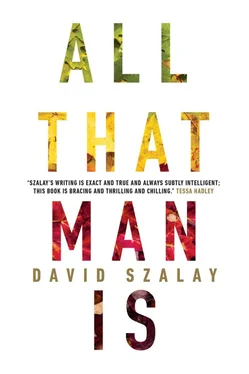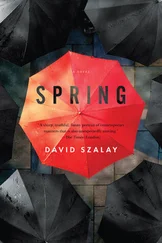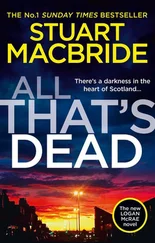David Szalay
All That Man Is
To every thing there is a season,
and a time to every purpose under the heaven.
Seventeen, I fell in love…
Berlin-Hauptbahnhof.
It is where the trains from Poland get in and the two young Englishmen are newly arrived from Kraków. They look terrible, these two teenagers, exhausted by the ordeal of the train, and thin and filthy from ten days of Inter Railing. One of them, Simon, stares listlessly at nothing. He is a handsome boy, high-cheekboned, with a solemn, inexpressive, nervous face. The station pub is noisy and smoky at seven in the morning, and he is listening, with disapproval, to the men at the next table — one of them American, it seems, the other German and older, who says, smiling, ‘You only lost four hundred thousand soldiers. We lost six million .’
The American says something which is lost in the din.
‘The Russians lost twelve million — we killed six million.’
Simon lights a Polish cigarette, sees the word ‘ Spiegelei ’ on a laminated menu, the money on the table, waiting for the waiter to take it — euros, nice-looking, modern-looking money. He likes the fonts the designers have used, plain, unornamented.
‘A million died just in Leningrad. A million!’
People are drinking beer.
Outside, drizzle is starting to dampen the grey environs of the station.
There was an altercation with the waiter — whether it would be possible to have two cups with a single Kaffeekänchen . It was not possible. They had to share one, Simon and his friend, who is now at the payphone — their mobiles don’t work here — half-hidden under its smoked plastic hood, trying to speak to Otto.
The waiter, in his stained scarlet waistcoat, had been insolent with them, Simon thought. Obsequious to others, though — Simon’s wary eyes follow him as he moves around, moves through the smoke and noise — to men in suits with newspapers, like that one, looking up with a sudden tight smile, looking at his watch as the waiter unloads the tray.
A voice starts to spew information about trains. A hard-edged voice penetrating from somewhere outside where the wind invades the spaces of the station. The voice is like a tap of sound — turned on, turned off.
Simon is familiar now with the facile snatch of tune that precedes each irruption of this voice
of this voice, and its echo.
And the facile snatch of tune, when it sounds, has started to seem like an extension of his exhaustion, like something inside him, something subjective.
The waiter literally bows to the suited man.
The life of the station plunges and swirls like a dirty stream. People. People moving through the station like a dirty stream.
And that question again –
What am I doing here?
He sees his friend Ferdinand hang up the payphone.
They have been trying to speak to Otto for days — he is someone Ferdinand met in London a few weeks ago, a young German who said, probably drunk, probably without expecting it ever to happen, that if he was ever in Berlin he was welcome to stay.
Ferdinand returns to the table with a worried expression.
‘Still no answer,’ he says.
Simon, smoking, says nothing. He secretly hopes that Otto will never answer. He has never been keen on the idea of staying with him. He did not meet him in London, and what he has heard about him he does not like.
He says, ‘What are we going to do then?’
‘I don’t know,’ his friend says. ‘Just go to the flat?’ He has Otto’s address — Otto is expecting them at some point this April, that much was arranged from London, sketchily, with messages on Facebook.
They travel two stops on the S-Bahn, and spend a long time looking for the flat, and when eventually they find it — unexpectedly, it is in a dirty little side street — there is no one there except a green-uniformed policeman. He waits on a landing where the stairs turn, one flight down from the door of the flat, in the murky light of a window.
Unsure why the policeman is there
Has Otto been murdered?
they hesitate.
‘ Tag ,’ the man says. From his voice it is obvious: no one has been murdered.
They say they are looking for Otto, and the policeman, who evidently knows who Otto is, tells them he is not there. No one is there, he says.
They wait.
They wait for over an hour, Ferdinand making a few trips to a payphone in the street to try people who might know where Otto is, while Simon sits on the tiled floor in the huge space of the downstairs hall, and tries to make progress with The Ambassadors , a dog-eared Penguin Classics edition that lives in one of the zip-up side pockets of his backpack. His tired eyes find these words –
Live all you can; it’s a mistake not to. It doesn’t so much matter what you do in particular so long as you have your life. If you haven’t had that what
have
you had? I’m too old — too old at any rate for what I see. What one loses one loses; make no mistake about that. Still, we have the illusion of freedom; therefore don’t, like me to-day, be without the memory of that illusion. I was either, at the right time, too stupid or too intelligent to have it, and now I’m a case of reaction against the mistake. Do what you like so long as you don’t make it. For it
was
a mistake. Live, live!
He takes a pen from the same pocket of his pack where the novel was and with it makes a vertical line next to those words. Next to the vertical line, in the margin, he writes, MAIN THEME .
Ferdinand returns, damp with playful rain, from the street.
‘What should we do?’ he asks.
The S-Bahn again.
The rain has stopped. From the windows of the train they see things. A memorial stretch of the Wall, thick with psychedelic graffiti. They don’t remember that world. They are too young. Sunlight out there on the empty land, shining through the spaces where the Wall used to be. Sunlight. Through the windows of the S-Bahn train, through their lace of impurities, it touches Simon’s shrinking eyes.
What am I doing here?
What am I doing here?
The train whacks over points.
What am I
The train slows
doing here?
into a station, open to the air — Warschauer Straße. Windy platforms, a waste land all around.
A waste land.
April is the…
They are in love with Eliot, with his melodious pessimism. They are in awe of Joyce. He is what they want to be, a monument like him. These are the writers whose works made them friends. And Shakespeare’s tragedies. And L’Étranger . And the plight of Vladimir and Estragon, which they like to think of as their own. Waiting for Otto.
Warschauer Straße. Trains move among the lusty weeds. Spring showers strafe the peeling hoardings, the overpasses spilling the sound of unseen traffic.
In Kreuzberg they sit down exhaustedly to lunch.
Kreuzberg is a disappointment. It was supposed to be the hipster district, the Alternativ quarter. Ferdinand, in particular, is disappointed. Simon puts food into his shapely mouth. He had not expected anything from Kreuzberg. He had no interest in it, and finds his friend naïve — though he does not say so — for thinking it would be interesting.
There is some discussion, as they eat, of how much more expensive everything is than in Poland (they did Warsaw, Kraków, Auschwitz) though the higher prices are justified, is their feeling, by the superior quality of everything in Berlin. The food, for instance. They eat hungrily.
Читать дальше












